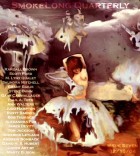First of all, I love the rhythm of this piece. There’s something very musical about it. Does music influence your work at all?
Thank you, and the answer is yes, definitely. I love drummers like Max Roach and Art Blakey, and I wish I had been there to see and hear them firsthand. I try to make my sentences have that effect, especially in novels. If I caught someone tapping her foot while reading one of my novels, I’d consider that high praise.
You’ve delved into a lot of different genres. How has this affected your more literary work?
In genre fiction, the world impacts the characters more than it does in the average mainstream story or novel. I make this point often, and I think I’ve misstated what I mean. So to clarify, I’m not talking about writing current event fiction. What I mean is writing in a way that involves the larger world, and characters who know there is something beyond their immediate problems, beyond them. I don’t mean any god. I mean the zeitgeist. I think when writers describe the sky, that’s what they’re getting at, but that gets tiring. George Carlin has a good line about that: “Stop describing the sky and get on with it,” to paraphrase. Anthony Neil Smith had another good line about a writer whose name I won’t mention: “He must have a macro for sky descriptions.”
My work is affected in that I experiment with both in my stories, sometimes writing nearly straight literary fiction and other times nearly straight genre fiction. In the novels, the two come together in a way I think works best for me. No matter how ridiculous or funny, intentionally or not, my novels may be, that’s when I’m at my most serious and, I think, on beat. The stories seem to be a way of sharpening one or another side of the same stone.
Your novel Fizz got terrific reviews. Can you tell us a little about your latest, Fishnet?
Fishnet concerns two themes. First, the “married me” a person starts to become soon after the wedding, and how he or she never forgets that old shadow self lurking within. Specifically, Fishnet looks at two such married people and what happens when their hidden selves revolt. Secondly, the novel concerns a dying industrial town trapped in a myth that goes back to its origins. Fishnet is intended as a kind of children’s story for adults and, hopefully, reads like a fable. It has similar themes to Fizz but is written in the third person and has an entirely different flavor.
You’re one of the more intensely prolific authors we’ve published. What sort of writing schedule do you set for yourself?
Well, it used to be a story every week or two and one novel per year. I should note my novels, the three completed ones, are short. Lately, I’ve slowed a bit, since I recently decided to complete my BA and then continue from there toward an MFA—if I can somehow stay ripe in the preserve factory. Usually, I write about five hundred words a day, five days a week, when working on a novel, and maybe a thousand or two a week the rest of the year. Nothing too grueling when you consider I don’t have the commitments many other writers do.
Finally, looking back on your own beginnings as a writer, what are some things you feel you did well, and what are some things you’d change in your approach?
Well, Stanley Elkin said there are “yes” and “no” writers, as in “yes to the world” or “no to the world.” I’d say I’m a “no, no, no, well, okay” writer. Meaning at the end of the day, there are things that make life worth the unbearable idiocy that occupies so much of it. And I like to think “Fizz” and “Fishnet” capture that equation.
As to the second part of the question, impatience is my lifelong flaw, and writing is no exception. I feel a terrific pressure of time. This has its good and bad points. The good ones are in print, and so are the bad ones.
Lastly, I am not always diplomatic in attacking certain literary quarters, but in doing so, I only mean to play some little part in preventing fiction from sliding into an oblivion of specialists. I think writers are witnesses. That’s an important task. They—and I—should try to witness what has not yet been made visible.



 The core workshop of SmokeLong Fitness is all in writing, so you can take part from anywhere at anytime. We are excited about creating a supportive, consistent and structured environment for flash writers to work on their craft in a community. We are thrilled and proud to say that our workshop participants have won, placed, or been listed in every major flash competition. Community works.
The core workshop of SmokeLong Fitness is all in writing, so you can take part from anywhere at anytime. We are excited about creating a supportive, consistent and structured environment for flash writers to work on their craft in a community. We are thrilled and proud to say that our workshop participants have won, placed, or been listed in every major flash competition. Community works.